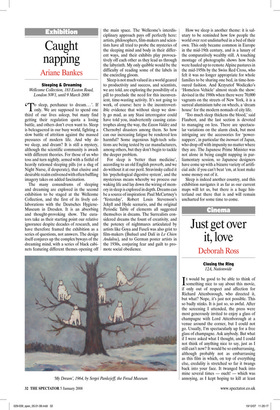Just get over it, love
Deborah Ross
Closing the Ring 12A, Nationwide
It would be good to be able to think of something nice to say about this movie, if only out of respect and affection for Richard Attenborough, who directed it, but what? Nope, it’s just not possible. This so badly stinks. It is just so, so awful. After the screening I attended, the press were most generously invited to enjoy a glass of champagne with Lord Attenborough at a venue around the corner, but I could not go. Usually, I’m spectacularly up for a free glass of champagne. Ask anybody. But what if I were asked what I thought, and I could not think of anything nice to say, just as I still can’t now? It would be so embarrassing, although probably not as embarrassing as this film in which, on top of everything else, credulity is stretched so far it twangs back into your face. It twanged back into mine several times — ouch! — which was annoying, as I kept hoping to kill at least some of the two hours with a good, oldfashioned doze.
The film opens in Michigan, in 1991, with Ethel Ann (Shirley MacLaine in the most hilariously youthful wig) attending the funeral of her husband Chuck. She does not appear especially bereaved or upset, but then if you had a husband called ‘Chuck’, would you be? When Ethel Ann then begins acting strangely, only her friend Jack (Christopher Plummer) seems to understand why. It quickly emerges that there is a lot Ethel Ann’s daughter Marie (Neve Campbell) does not know about her mother’s past and the true story of her love life. Much of the story is told via flashbacks to the 1940s when Ethel Ann (now played by Mischa Barton) was young and beautiful, had hair that appeared to be her own, and was in love with a young farmer, Teddy (played by Canadian newcomer Stephen Amell as a sort of Robert Redford Lite; Very, Very Lite). There is one semi-nude sex scene which doesn’t add much to the story and is almost unbearably stiff — in the unintended sense — but does mean Ms Barton gets them out for the boys, which is nice. For the boys.
Anyway, right to the schmaltz fest at the end, Closing the Ring heaps melodrama on to melodrama via melodrama. I’ve never felt so melodrama-ed in my life. Teddy goes off to war with his best friends Jack and Chuck, who are also in love with Ethel Ann, and doesn’t make it back. Meanwhile, in present time, on a hillside in Belfast, an old fella called Michael Quinlan (Pete Postlethwaite) and a young lad called Jimmy (Martin McCann) find a ring inscribed with ’Ethel Ann’ and ‘Teddy’ in the wreckage of a crashed B-17 and are determined to return it to the woman who once owned it. With regards to credulity, at one point Ethel, Jack, Jimmy and Michael all wind up on the same Northern Irish street between two IRA bomb attacks so that Michael can at last reveal a decades-old secret. Now, what are the chances of that?
This is meant, I imagine, to be a good oldfashioned ‘love spanning the decades’ weepie, but, as it’s impossible to believe even one man might have ever been in love with Ethel Ann, let alone three, it has nothing at its heart. As a young woman, Ethel is beautiful and wears the most heavenly dresses (there, I thought of something nice to say) but is entirely vapid, as is Teddy. As the older woman, she is miserable and selfish, nasty to her daughter and so self-obsessed that what she needs isn’t so much the return of the ring to aid her ‘grieving’ but a good shake and for someone to shout at her, ‘Just get over it, love.’ MacLaine performs without even a whiff of sympathy. Christopher Plummer? He not only has to say some of the worst lines imaginable — ‘talk to her or you will lose her’ — but also overemotes to the extent that you don’t know quite know where to look. There is a scene in a bar where he is meant to break down and so break our hearts, but you know what? Everyone in the audience laughed. How awful is that? Awful, awful, that’s what it is. There is no way I could have gone for that champagne.
What was Dicky thinking of? Everything is a cliché, including the direction, where scenes are dark during dark times and sunny during sunnier times. The best thing in this, by far, is Brenda Fricker, who plays a wartime tart turned grandmother, but she isn’t in it nearly enough. I feel bad about saying all this, because of Attenborough and everything, but I did quite like Gandhi. Is free champagne still on the go for that?



















































 Previous page
Previous page